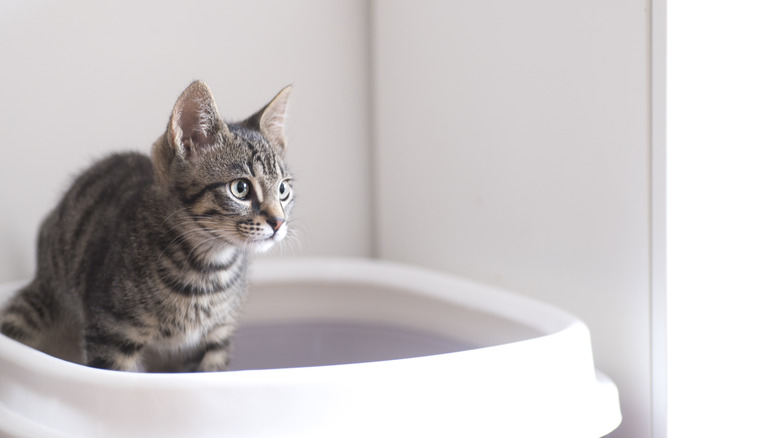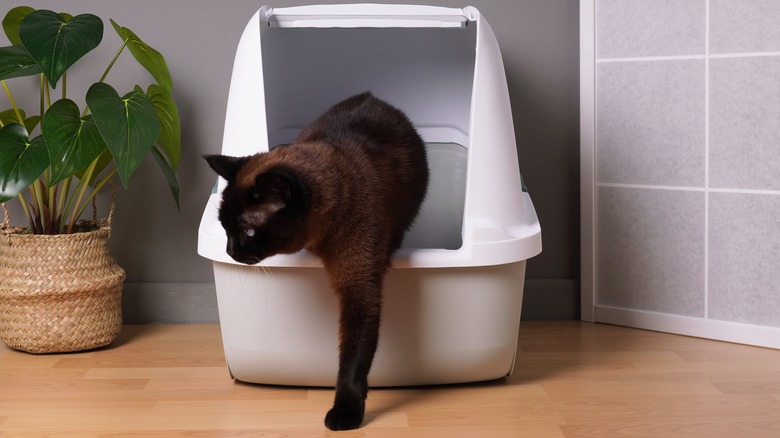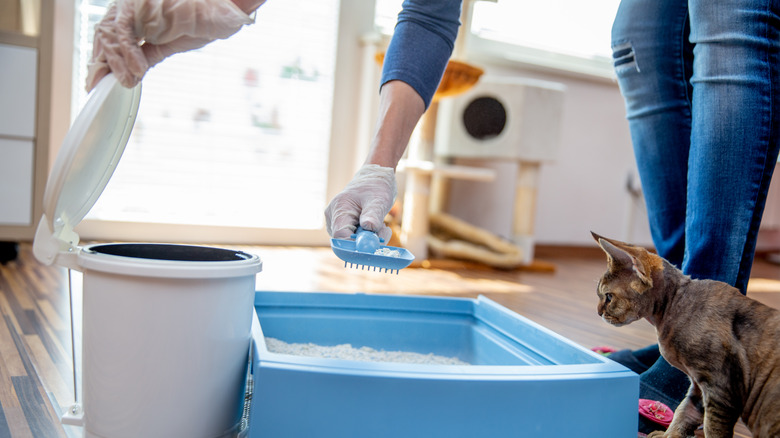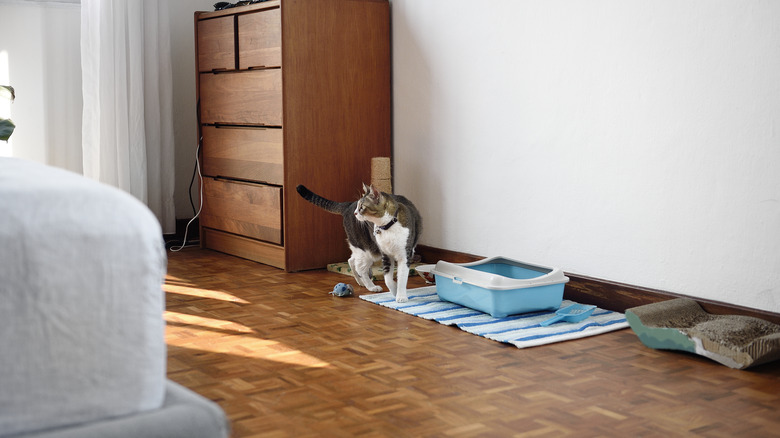Weapons Against Your Cat's Smelly Litter Box That Actually Work
Unpleasant odors are a downside of pet parenthood everyone has to deal with at one point or another, and the main culprit behind these smells is the litter box. Cats need litter boxes, but sometimes the stench becomes overwhelming. While the smell can be a lot for you to handle, cats don't enjoy it either, and a stinky litter box can lead to bigger issues if your cat stops using it due to its miasma.
If your cats' litter boxes seem to always be extra smelly, you may not be cleaning it properly, which can lead to your kitty getting infections from bacteria growing in the litter. Aside from the rancid odor, your cat could develop urinary tract infections, bladder stones, and kidney infections from a dirty litter box. While there's no magical way to eradicate smelly litter boxes for good, there are some simple approaches you can take to combat stench, prevent infection, and help your cat love their litter box.
Choose the right litter box
The very first step for a stink-free litter box is choosing the right fit for your cat. One of the most important factors when selecting a litter box is size. Typically, you want a litter box to be at least the length of your cat from head to tail. When it comes to the best litter boxes for fighting smells, there are a few factors you'll want to consider.
The main types of litter boxes available are covered and uncovered boxes. They both have their pros and cons, and you may want to try both and see which your cat prefers. However, when talking about odor control, a covered litter box is going to be the better bet between the two. While covered litter boxes will help contain the stench in your home, be sure to choose one with good ventilation so your kitty isn't too affected by an overwhelming smell when they use it.
Another factor to consider when choosing a litter box is the material. Plastic is a common material, but probably isn't the best option if you're looking to reduce smell, as plastic is known to absorb odor, especially in the scratches your cat's claws might leave behind. Instead, opt for a stainless steel litter box as a more hygienic, durable, and less stinky choice.
Use odor-absorbing litter
Another important step for odor control is choosing the right litter. There is an abundance of litters on the market — different materials, scented and unscented, clumping and non-clumping, the list goes on. It might be tempting to opt for a scented litter to try and mask odor, but these fragrances can cause respiratory problems in certain cats, so scented litter might be best avoided. It's also important to put an appropriate amount of litter in, usually no more than 2 inches deep, as most cats don't prefer any more than that.
Clay is one of the most popular cat litter materials due to its clumping abilities, making it easy and low-maintenance for cat parents to scoop up. Luckily, clay is also a decent option when it comes to controlling order, due to its high absorbency. When deciding on a litter, another ingredient to look for is activated charcoal, which can help eliminate and control those icky smells. Silica is another material good for fighting odors, as well as pine if you prefer a more natural approach.The number one thing to consider when choosing or switching litter is your cat's personal preferences, as the litter won't help control stink if your cat doesn't want to use the litter box in the first place.
Follow a regular litter box cleaning schedule
Arguably the best way to keep your cat's litter box stink-free is with proper cleaning. Scooping litter every day is essential to combat smell, and your cat may not want to use the box if it gets too full. You are also going to need to deep clean and change out the litter frequently. How often you change the litter is dependent on a number of factors, such as the type you use and your personal scooping habits.
With clay litter, you'll typically want to change it out twice a week, but you may need to do so more or less often depending on how often you scoop it. It's best to deep clean whenever you change the litter using hot water and a little unscented liquid dish soap. Do not use bleach, as it could react with the ammonia in any residual cat urine and produce a harmful gas. Cats also don't like the smell of bleach and other harsh cleaners, and they may refuse to go to the bathroom in the litter box if they encounter these scents. Keeping your scooper clean will also reduce odor in the long run, so deep clean it with the box. After around a year, you may want to replace the litter box, especially plastic ones that may be scratched or that your cat uses often.
Place the litter box in a spot with good ventilation
Choosing a prime location for your cat's litter box is another simple way to reduce stench. It might be tempting to put it out of the way and out of sight, such as in a mudroom or bathroom, but keeping it in one of these smaller spaces can perpetuate the smell even more. While a litter box isn't the prettiest sight, it's best to find a well-ventilated area to keep it in, so both you and your cat don't have to deal with the intense odor often caused when litter boxes are confined to cramped spaces. It's also important to keep litter boxes away from your cat's food and water, as well as in a quiet space.
Observe the rooms your cat likes to spend time in and put a litter box in these spots, as they will be more likely to use it. Along with choosing an ideal location, if you live in a multi-cat household, you want to make sure you have enough litter boxes for everyone (one per cat, plus one extra box). To help reduce odor and allow for easy access, spread the litter boxes throughout your home.
Try an air purifier and deodorizers
Another approach that can help with odor is placing an air purifier near your cat's litter box. Air purifiers are known to help with home odor, and for a litter box, you will want to be sure to get an air purifier with an activated carbon filter, as these are known to trap odor best. Litter box liners may also help if you are someone who doesn't have the time to constantly scoop and change litter, but it's important to know that cats can get their claws stuck in them, so other odor-fighting methods might be better options.
Deodorizers are another product that can help get rid of stinky litter smells. The best cat litter deodorizers are unscented or lightly scented, as they most likely won't affect your cat. Baking soda is typically one of the top ingredients to look for, as it's known to absorb and neutralize odors. If you'd prefer not to use a deodorizer but still want to try out baking soda, you can place a thin layer of it on the bottom of the box to help offset the stink.




